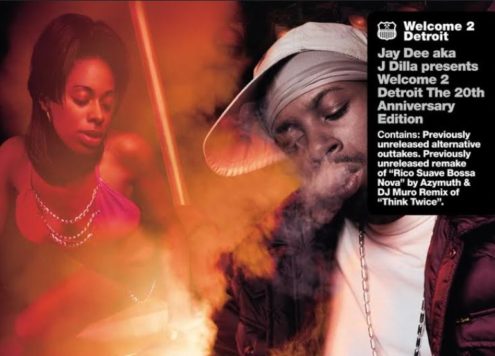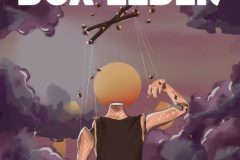In hindsight, there are definitely moments when my decisions haven’t made any sense. Throughout the years I’ve received albums I’ve carelessly given away since I was always inundated with album after album. This leads me to the reissue of Longstocking’s Once Upon A Time Now (Jealous Buther Records) which was originally released on Chainsaw Records. Of course, back then I didn’t make the best decisions as I mentioned but we all get to revisit the album, originally released in 1997 and 24 years later, the album’s power holds up. From the opening pop fury of “Teenage Angst At 27,” you get an idea of what’s to come; and that’s just walls of guitar oozing melody, a bit of dissonance, and harmonies that won’t escape my memory. The L.A. band was part of the Queercore Punk movement, but it could have probably moved further than that had the band stayed the course because its music transcends scenes, schemes, and genres. Also released today is the band’s Singles & Demos: 1994 – 1998 and while I’m all about the band’s one and only album, we also get a look into the band’s early recordings. The promise of the band’s music was there but it was refined with its one full album. This is a great starting point but all of Longstocking’s music is worth its weight in gold.
I was sitting here wondering about Killer Kin, this band out of New Haven, Connecticut fronted by vocalist Mattie Lea with guitarist Chloe Rose at his side. That’s my assumption anyway. Although the information I have at hand looks like this single was released today, it looks like it may have been released last week? Well, I don’t really care but the music on “Sonic Love” / “Narrow Mind” (Pig Baby Records) just oozes sexuality and sensuality, delivered with garage-rock enthusiasm that’s kind of mind-blowing. The band barely leaves any breathing room here with frenetic drum movement, distortedly loud guitars, as well as Mattie Lea’s maniacal vocal delivery. The band barely leaves any room to breathe but if you’re wearing a mask, do you really need to come up for air anyway? Probably not. Two songs from Killer Kin just isn’t enough to whet anyone’s appetite. Fortunately, the band has a 5-song E.P. it released last year if you can’t get enough. Trust me, you’ll want much more. The recording is a bit tame but it’s more of that dirty.
Never one to claim to have all the answers, I’ll still make the attempt and educated effort to give as much as I can. If using movie quotes and song lyrics help to get that point across, then I’ve done my job. But using those quotes and lyrics are almost ritualistic in nature although it’s fortunate that not many know or remember the information that’s regurgitated.
Enter: TV Priest, England’s best answer to, well, just about anything. This week marks the band’s debut release Uppers (Sub Pop) and going forward I plan on answering so many questions with vocalist Charlie Drinkwater’s lyrics, even if they don’t make sense, and chances are they won’t. But what this new album is about is the band, rounded out by guitarist Alex Sprogis, bass and keys player Nic Bueth, and drummer Ed Kelland, with an incessant need to deliver crunchy guitar riffs, elevated rhythms, and dynamic shifts from song to bludgeoning song. Thick and cavernous guitars rip through the opening “The Big Curve” as Drinkwater spews his words with vehemence, confusion, all wrapped within an angered delivery as he searches for answers to questions that don’t seem to make any sense. Sprogis remains focused with his guitar that clangs with slight dissonance as Bueth & Kelland keep a stormy pace never letting up. But Sprogis’ guitar at times creates an underlying melody making way for what could be a keyboard wash or his guitar running through effects. Either way, it works.
What’s interesting here is Drinkwater’s conviction in his delivery. Every moment on Uppers, is profound, whether he ties just a few words together or pieces together much deeper thoughts. On “Journal Of A Plague Year” the band takes its time, slowly building around a theme of 2020 and beyond, as seen through his own eyes. Drinkwater remarks on new normalcy, death, and the past. Like many, it doesn’t seem he’s very happy about it all as of course, we shouldn’t find comfort in it. The band backs with what could be a fleshed-out, free-formed jam session that makes complete sense along with the lyricism included. It’s a tricky beast of a song that’s one of my favorite cuts here. The band follows it with the dreamy soundscape of the instrumental “History Week,” which could seem out of place but isn’t. The guitar washes of white noise and controlled feedback allow its beauty and elegance to rise to the surface. It’s brilliantly captured.
One thing that you won’t find on this release is a track that falls short of anything but amazing. The band’s focus is unencumbered as songs like “Powers Of Ten” attest. The song may sound rudimentary to the naked ear but as it crescendos and builds around Sprogis’ guitar and Drinkwater’s voice, the melody gets much clearer to find as the rhythm is on the brink of explosion. There’s no shift in dynamics here, nor is there need of one, the band closes the track as the spark of feedback slowly winds down. But it’s the 7-minute plus of “Saintless” where I find myself completely enamored with TV Priest. The lengthy number eases back its freneticism in lieu of building around a rhythm and Drinkwater’s distorted vocals while guitar notes are plucked throughout. When the rhythm section changes things up though, that’s when Bueth kills it. Those thick notes of his stand above everything else! That is until Sprogis sets his guitar to 11 and we’re hit with sonically fervent echoes.
With its debut album, TV Priest seems to be aware of its strength and utilizes them differently from track to track, all the while allowing the songs to cohesively communicate with one another. The band’s punk aesthetic is clear but they don’t sacrifice melody or song structure for it, they let it all joint together and we’re all the better for it.
Facebook | Twitter | Instagram
Classic albums always seem to get revisited, remastered, and expanded. It shouldn’t come as a surprise when it happens, although there are many that always scoff at the idea of having something old, new again. I myself am not one of those detractors. Clearer sounds, additional material…why not?
Yes, it’s actually been 20 years since the innovative producer/emcee J Dilla released his solo debut album; 2 decades! It’s hard to fathom but the new Welcome 2 Detroit – The 20th Anniversary Edition (BBE) just dropped and fanatical heads like myself, yeah, we’re getting it. A box set of 7” vinyl that includes instrumental tracks of the album. Seriously, this release marked a change in how artists viewed music from a beat perspective. Dilla was given the freedom to explore and challenge the status quo, and you almost forget he was part of Slum Village just a year earlier. But of course he couldn’t completely shake the ghost of his the project he was a part of. Just listening to “Think Twice (feat. Dwele” you’ll be hit with some SV nostalgia but it’s all J Dilla here. The sweet horns and keyboards, accentuated by finger snaps, hand claps, percussion and drums is titillating.
J Dilla wasn’t averse to bringing in his people for this release. Emcees like Blu on “The Clapper,” pre-SV Elzhi on “Come Get It” which probably remains one of my favorite tracks with volleying rhymes over a smooth beat. Also featured on the album were Frank-N-Dank, and Phat Kat. 20 years may have passed but the album hasn’t suffered through time, withstanding it like a motherfucking boss. Beat miners will appreciate the instrumental versions and we’re sure to hear an assortment of emcees throwing down lyrics on these now new classic beats.
Moments like these are the ones that occasionally have me shaking in my chucks. Attempting to find the right words to thoroughly describe something that’s been in front of me playing incessantly for the past couple of weeks not because I have to but also because I want to. This is the point in the matrix where feeling like a rodent in a wheel comes into play. But here goes anyway.
The stories and legends are true, Dark Time Sunshine does exist and the duo of emcee Onry Ozzborn and sound manipulator Zavala return after a 9-year hiatus. Lore (Fake Four Inc.) is the follow up to 2012’s ANX which still remains on a number of music writer lists and decks. “Lore (feat. Ceschi)” packs a proverbial punch with both Ceschi & Ozzborn volleying lyrics with one another. It’s clear they’re back(!) waving the DTS banner high. Note: It’s obvious the song is derivative unto itself, beginning exactly as “Hosanna In The Highest,” off ANX, which also featured Ceschi. It was also the opening track on that album as well. Brilliant. Ozzborn has always twisted his words cleverly when rapping on specific subjects and on “Ritalin,” he uses an array of metaphors and descriptives on self-reflection on mental health, with use of prescription drugs that lead to a false sense of worth. But it curbs the pain. Momentarily anyway. Getting that therapeutic help is the best laid out plan.
“The Rite Kids,” features R.A.P. Ferreira and Homeboy Sandman, and is probably one of the tracks many listeners will find most relatable, as the emcees spin words around the misunderstood, the kids that don’t fit in, who instead march to the beat of their own one-man-band performances. They’re usually the ones destined for greatness. This is prophetic, and fiery reality pieced together in a track that makes all the sense in the world. The duo’s album is rife with Zavala’s signature soulful and experimental pop style, and every track hits with a captivating fervor but some hit harder than others. “Poor Pavel,” with its misleading melody is wickedly alluring, with Rob Sonic & Aesop Rock on the beat for the assist. Ozzborn doesn’t boast but rather gives clear reasoning on doing better; in a way boasting without being boastful. Sonic’s descriptives could be misconstrued as opening with self-deprecation but it’s his own way of focusing his words without saying, “Yeah fuck it, I’m here you bastards.” Aes though, his use of mixed metaphors clearly is what it is: Aesop Rock.
DTS moves in ways most groups wouldn’t, and that’s by actually expressing emotion. “Hell Nah” is expressive in the hook itself: pull yourself out of hellish situations and constantly attempt to avoid pitfalls. On “Look At Her Go,” Zavala’s beats and melodies fit well alongside Ozzborn’s words as he questions love, goes crazy for it, and loses it. It’s expressive as we visualize literal hearts-on-sleeve enthusiasm.
But it’s “Ayemen” that allows for a collective sigh of relief, one of the best songs on the album. For DTS it usually the song without featured guests that hits the hardest. Zavala’s beats and musicality here are beyond amazing and Ozzborn’s layered vocals fit in well on the chorus. He mines his words around medical procedures while also using film & music analogies, and that OG-era Ice-T reference isn’t missed either. It’s no surprise to find the closing “Better Off” right alongside it. The melodious track is fitted with samples from “The Show” (Dougie Fresh) but it’s just in passing as Ozzborn asks “Are we better off?” Are we? He poses the question with nary an answer and we’re left with more questions in the end.
My bias for the new Dark Time Sunshine album was palpable, even before spinning the first track. But Lore obviously comes through as we all knew it would. It’s almost been a decade of waiting and I’m sure some will wonder if it was worth it? Hell yes!
Facebook | Twitter | Instagram
There are moments when attempts are made to ignore press releases of artists that are RIYL or that may be inaccurately descriptive for whatever reasons. I tend to go directly to the source which is sometimes to my own detriment when I find next to nothing. But there are moments when gold is struck and we’re filled with fodder.
Here we find the new release by Sun June, a quintet out of Austin, TX by way of NY and L.A., the self-described regret-pop band just released its second long-player Somewhere (Run For Cover/Keeled Scales). “Regret-pop” has the alarms going off, wondering where the band is heading. As soon as the album kicks off, it all becomes clearer as singer Laura Colwell wistful vocals begin. They’re alluring, wrapped in a blanket of soft instrumentation, with guitars strumming away from track to track. Now while my fascination with Sun June’s music draws me in, I’m not always comfortable with the lyricism. The opening “Bad With Time” well, doesn’t make much sense although the band’s drive through it is captivating. The same might be said for “Karen O” which doesn’t have much to do with the Yeah Yeah Yeahs vocalist but focuses on NYC city life as Colwell sings of her father calling and leaving messages, a singer in a two-thousand-dollar suit, and not wanting to leave Manhattan. Here the music’s melancholic timbre is what’s soothing. The lyrics may make sense to Colwell but I’m not sure they’ll translate well with the average listener. Or any listener for that matter. But this is the conundrum that I seem to be faced with.
Sun June isn’t bad, they’re actually quite good when all the pieces seem to fall into place. That moment is on “Everywhere,” as Colwell sings of lost love that she seems to see at every turn. The band capitalizes on this, infusing it with a pop melody that’s unrelenting. The musicians build around the guitar that slinks alongside Colwell and the group closes things out a bit more voluminous, matching her vocal delivery. Now as I slide through “Once In A While” I feel the emotion in both the music and Colwell’s words. Here she deals with her own short-comings and that in itself is a brave thing to do, addressing them to someone to no avail. We become invested in the lyrics but it doesn’t stray or take anything from the music itself, which stretches like the vast landscape of Texas as mid-tempo beats are accentuated by keys and bass. Yes, regret-pop. But it doesn’t end there. Sun June’s “Finding Out” has me completely perplexed and enamored with the band in every aspect. The guitar that leads the way with its melody has me hooked as the rhythm section never has a need to grandstand; they move to perfection holding the song together. And with Colwell’s words, again, regret-pop. She masterfully weaves the imagery here.
Somewhere is filled with a number of hits and a few misses but in the end, the good obviously outweighs anything else. The album is what the band says it is. Regret pop. At times, peppered with haunting melancholy but that’s a good thing.











Social Media